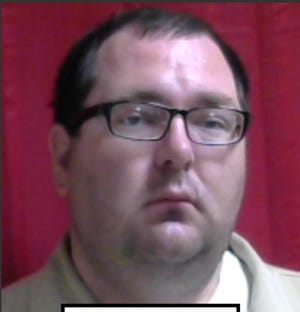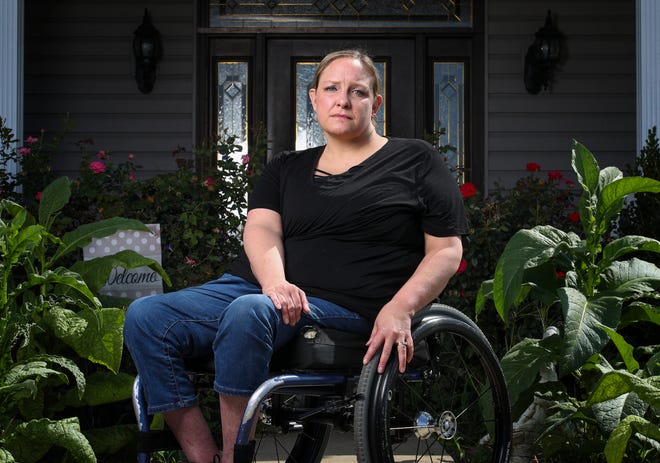LOUISVILLE, Ky. — Paralyzed from the chest down 25 years ago when freshman Michael Carneal opened fire on eight students at Heath High School in western Kentucky, Missy Jenkins Smith said she long ago forgave him.
She titled her published memoir, “I Choose to be Happy.”
But when Carneal, now 39, faces the Kentucky Parole Board – which could free him later this month – she will ask that he be ordered to spend the rest of his life in prison for killing three people and wounding five at the school.
She said she forgave him to move on with her life and that her forgiveness does not relieve him of the consequences of his actions.
Sabrina Steger, whose daughter Kayce, a 15-year-old sophomore, was killed by Carneal, also said she will urge the board not to parole him.
She refuses to mention his name. “I only call him ‘the killer,’” she said.
Gun violence report:Shots fired in US schools spiked dramatically last year
But Hollan Holm, whom Carneal shot in the scalp – and who suffered no permanent physical injuries yet endured emotional trauma for which he required counseling – said he will tell the board to free him if he can be placed somewhere where he is supervised and continues to receive treatment.
Holm, who like Carneal was a 14-year-old fellow freshman, said he cannot separate Carneal the shooter from the boy he rode the bus with every day to elementary school and sat beside in the lunchroom.
“I don’t view him as the sum of what he did on the worst day of his life,” said Holm, an attorney with two children of his own.
One of the first school shootings
The Heath High School shooting in West Paducah was one of the first school massacres in the United States, and Carneal is one of the only perpetrators to be considered for parole; most were killed in their attacks or sent to prison for life.
Carneal, who pleaded guilty but mentally ill to murder, attempted murder and burglary, was sentenced to life, but because of his age, he was entitled to be considered for parole after serving 25 years.
The parole board could release him, defer his case for years or order him to serve out his life sentence.
Victims and family members are scheduled to testify before the parole board remotely Sept. 19, and Carneal is to appear the next day.
Both parole hearings for Carneal will be open to the public on Zoom. The Corrections Department will release the phone numbers later this week, spokeswoman Lisa Lamb said.
Carneal’s immediate release is unlikely. The parole board said on its website that “public safety” is its “paramount concern.” And its most recent figures show it paroled only 39% of inmates − most convicted of far less serious offenses than Carneal – the first time they saw the board.
Carneal declined to be interviewed. His parents, who have moved from Paducah to Northern Kentucky, plan to take him to their home in Cold Spring, according to a plan written for him by the Department of Public Advocacy.
“Please remember he was only 14 years old at the time of the offense,” said his father, John Carneal, a lawyer, pleading in the plan for his release.
It said when Carneal, using a .22 caliber semi-automatic pistol he had stolen from a neighbor, fired into a prayer circle in the lobby of the 500-student school, he was feeling hopeless about his life and suffering from hallucinations and delusions.
Only after he was incarcerated was he diagnosed with paranoid schizophrenia, according to his current lawyer, Alana Meyer.
She said over the past 25 years, he has worked with mental health professionals to find medications that have stabilized him.
And his parents said they will take him to community medical centers to continue his treatment.
“Since his crime … Michael has shown genuine remorse and taken responsibility for the shooting,” Meyer said.
Run, hide, fight:School shooter drills can be traumatic, but do they work?
Releasing Carneal would send the wrong message
But Missy Jenkins Smith, who is 40, offered no apologies for calling for him to remain in prison for life.
She said she fears he could long outlive his parents and there is no guarantee he could continue to take his medication.
“He is doing well behind bars and he should stay there,” she said. “Why mess with something that isn’t broken?”
She also said releasing him would send the wrong message to others contemplating school shootings.
In addition to Kayce Steger, Carneal also killed Nicole Hadley, a 14-year-old freshman who played in the school band and on the freshman basketball team; and Jessica James, who was 17, and a member of the marching band.
He also wounded Shelly Schaberg, who was voted Miss Heath High School by the senior class and was named homecoming queen; Kelly Hard Alsip, who was a member of the softball team and the Future Homemakers of America; and Craig Keene, 15, a member of the band and basketball them.
Several of them and their families are expected to testify before the board.
In her memoir, published in 2008 and revised twice since, Jenkins Smith told a story of hardship leavened with hope.
She described the embarrassment of wetting herself when she returned to school after months of painful rehabilitation. “I went to the office and cried,” she said.
She remembered the joy returning to play in the marching band, but how she could only play from the sideline in her wheelchair.
She said she didn’t date much in high school after the shooting because of the complications she faced, such as going to the bathroom. “I wasn’t comfortable revealing these problems to boys,” she said.
But in the book, subtitled “Lessons from a School Shooting Survivor” and written with former Cincinnati Enquirer reporter William Croyle, Missy writes that at a fraternity party in her junior year at Murray State University, she met the love of her life, Josh Smith. They married and have two children, Logan, 15, and Carter, 12
They survived school shootings:Now their own kids are in classrooms amid rising epidemic.
They live near Murray, where she worked for many years as a counselor in a Calloway County public schools day treatment center. She also learned to get around using a walker. But because of injuries to her hands and arms, for which she has required surgery, she had to give up both.
She said she worries that her health is deteriorating at only age 40, and that her sons already take care of her more than she does them.
“I have my pity parties,” she said. “I fear for the future.”
“But I am still alive and I have a family,” she said. “I wouldn’t have that if I was killed that day. I am blessed.”
In her book, she said to remember that forgiveness is not a sign of weakness.
“It’s the exact opposite,” she said. “It’s a sign of strength and courage. It shows maturity. And in the end, it makes you a better person − in your eyes, the eyes of those around you, and the eyes of God.”
Follow Andrew Wolfson on Twitter: @adwolfson.




